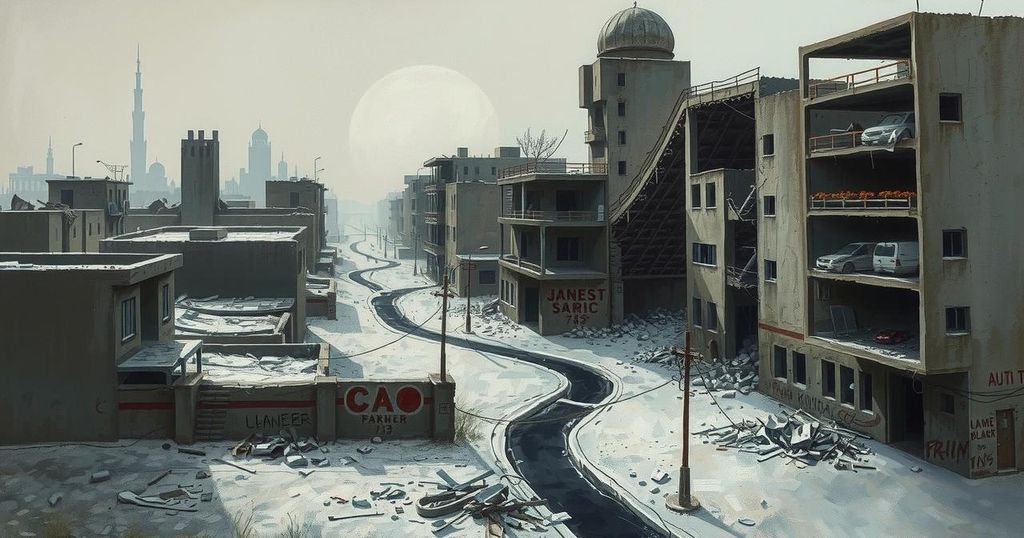The recent recapture of Khartoum by Sudan’s Armed Forces has raised concerns about the humanitarian crisis affecting civilians. Despite military gains, local humanitarian efforts remain strained, with critical shortages impacting the population. Analysts warn against assuming peace is near, as internal divisions and regional dynamics continue to pose challenges. Urgent international engagement is needed to address the crisis and facilitate humanitarian access.
In recent developments, Sudan’s military leader visited the presidential palace in Khartoum, following the Sudanese Armed Forces’ (SAF) recapture of the city from paramilitary forces. The ongoing conflict has devastated both the city and the country since April 2023, leading to widespread suffering among its residents.
Mathilde Vu, an aid worker with the Norwegian Refugee Council, expressed concern, stating, “It is heartbreaking to see people dying in huge numbers from hunger in Sudan, once the breadbasket of East Africa.” Local grassroots efforts have emerged as vital in response to the humanitarian crisis, with responders organizing crucial services without official resources.
However, these grassroots efforts face significant risks, particularly after the loss of at least ten local responders amidst intense fighting. Vu noted, “If one local responder dies, one kitchen is closed. And with that, entire families are left without food.”
The Sudanese Armed Forces have reported gaining control of key areas, such as the presidential palace, central bank, and airport. While these accomplishments are significant, the question of whether they will foster stability remains uncertain. This sentiment is echoed by South Sudanese-American political scientist Abiol Lual Deng, who cautions against viewing the SAF’s advances as heralding a new era.
Deng remarked, “This is a city where people died from starvation and infectious disease — not just bullets.” Although the SAF’s control may allow some humanitarian aid to return to those in need, she highlights the overwhelming scale of the crisis, noting that two-thirds of Sudan’s population requires assistance.
The devastating impact on Khartoum’s civilian infrastructure extends beyond immediate humanitarian needs, affecting national economic stability. The SAF’s enduring control will depend on its ability to restore essential services. Dallia Abdelmoniem, a Sudanese analyst, notes that many displaced civilians plan to return, despite lacking security guarantees.
She remarked, “For many Sudanese, they do not have the privilege to wait for full reconstruction.” However, any assumptions of a war resolution are seen as premature. The Rapid Support Forces (RSF), although withdrawn from Khartoum, have fortified their presence in Darfur, continuing to act as a parallel authority.
Deng explained, “The RSF has already established a parallel government. They are not disappearing.” The situation in Darfur raises concerns regarding a return to conflict, as the SAF may be emboldened to pursue military solutions. Abdelmoniem warned, “Negotiations appear dead in the water.”
Current hostilities have dire consequences for civilians, exemplified by the plight of those trapped in Darfur. Vu depicted harrowing scenes of families attempting to flee siege-like conditions. Access to these areas is markedly restricted, with humanitarian aid often obstructed by both sides in the conflict.
Despite these challenges, organizations like the International Committee of the Red Cross and Médicins Sans Frontières strive to maintain humanitarian efforts, although access depends on external pressure against the armed factions. International responses have been criticized as inadequate, leading Vu to stress the urgent need for unhindered humanitarian access, irrespective of ongoing violence.
Internal dynamics within the SAF remain fragile, with potential leadership fractures complicating the scenario. Deng reiterated their historical ties to the RSF, stating, “Now they have turned those tactics on each other.” The conflict implicates broader geopolitical concerns, with rising stakes as international powers engage in regional struggles.
As Khartoum stands at a crossroads, the question of whether the SAF can convert military victories into lasting peace remains unanswered. Civilians grapple with their shattered lives, and while aid trickles in, it is far from adequate. The urgent need for political solutions and humanitarian engagement is paramount, with Vu reiterating, “Without strong engagement, especially from countries with influence over SAF and RSF, aid will remain politicized and civilians will keep paying the price.”
The evolving situation in Sudan highlights the complex interplay between military action and humanitarian needs. As the SAF consolidates control in Khartoum, the ongoing suffering of civilians remains a pressing concern. The fragility of local humanitarian efforts and the potential resurgence of conflict in other regions underscores the urgency for international engagement and support. A coordinated response is essential to prevent further deterioration and to address the widespread humanitarian crisis, reinforcing that aid must be prioritized for all, regardless of the conflict.
Original Source: www.arabnews.com






